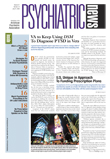For over a decade, scientists have attempted to find new drugs for affective disorders by targeting specific nerve receptors known to be involved in those conditions. Now investigators are starting to use a similar tack to find valuable new drugs for treating schizophrenia (Psychiatric News, May 19).
One of the more provocative dramas unfolding in this domain concerns the alpha-7 nicotinic acetylcholine receptor. Faulty alpha-7 receptors appear to be responsible for some of the neurocognitive deficits in schizophrenia, notably difficulty in paying attention. Moreover, nicotine has been found to enhance the action of the alpha-7 receptors and to lead to a modest improvement in neurocognition function, especially in concentration, in individuals with schizophrenia. Indeed, the reason why persons with schizophrenia often smoke heavily may be because nicotine helps them pay attention better and think more clearly.
Robert Freedman, M.D., chair of psychiatry at the University of Colorado Health Science Center, Ann Olincy, M.D., associate professor of psychiatry there, and colleagues decided to search for an alpha-7 receptor agonist that is better than nicotine at enhancing the mental performance of individuals with schizophrenia. Freedman is also editor in chief of the American Journal of Psychiatry.
The search led them to a compound derived from a marine worm and dubbed DMXB-A. After DMXB-A showed positive neurocognitive effects in both experimental animals and in healthy human volunteers, the researchers decided to conduct a small “proof-of-concept” study to see whether DMXB-A might also show promise as a mental enhancer in individuals with schizophrenia.
Eleven persons with schizophrenia participated in the trial. Although none of them smoked, all were taking antipsychotic medications. On one day, they received DMXB-A, and immediately afterward their neurocognitive performances were measured with the Repeatable Battery for the Assessment of Neuropsychological Status (RBANS). The RBANS measures attention, immediate memory, delayed memory, language proficiency, and visuospatial ability. On another day, the subjects received a placebo, and the RBANS was used to measure their neurocognitive performances right after. The mental performances of the subjects under the two conditions were then compared.
DMXB-A led to significantly better mental performances than the placebo did, the researchers reported in the June Archives of General Psychiatry. And these superior performances were also greater than those produced by nicotine in another small study of schizophrenia subjects conducted by the same group. Thus DMXB-A might indeed enhance the neurocognition of individuals with schizophrenia and perhaps better than nicotine does, the group concluded.
Moreover, “we were surprised by the marked effects that some of the patients experienced in terms of the clearing of their cognition and the decrease in their symptoms,” Freedman added in an interview with Psychiatric News. “We did not expect that much effect after a single-day administration [of DMXB-A]. Improvement in schizophrenia, even for a brief period, is always a heartening finding, because it suggests the possibility that the patients' disability can improve.”
These results, however preliminary, are “very important,” William Carpenter Jr., M.D., told Psychiatric News. Carpenter is director of the Maryland Psychiatric Research Center and a schizophrenia authority. “Impaired cognition and primary negative symptoms are the critical unmet therapeutic needs for schizophrenia.” And even if DMXB-A per se does not pan out as a schizophrenia medication, it still adds to the growing body of evidence that “the alpha-7 nicotinic acetycholine receptor is the best molecular target for new drug discovery in schizophrenia.”
Freedman and his colleagues are now conducting a phase 2 trial with DMXB-A, and 30 subjects are enrolled. “We expect results late this year,” he said.
The proof-of-concept trial was funded by the Veterans Affairs Medical Research Service, the National Institutes of health, the National Alliance for Research on Schizophrenia and Depression, the Stanley Medical Research Institute, and the Institute for Children's Mental Disorders.
